Spain PM says Catalan independence vote 'can't take place'
MADRID - Agence France-Presse

Spain's Prime Minister Mariano Rajoy speaks during a state of the nation debate at the Spanish Parliament in Madrid, Spain, Tuesday, Feb. 25, 2014. AP Photo
Spanish Prime Minister Mariano Rajoy said Tuesday that a referendum on Catalan independence planned for November 9 will not take place because it would be illegal.
"This referendum can't take place, it is not legal," he told parliament during an annual state of the nation debate.
"It is the entire Spanish people who have the capacity to decide what Spain is. No one can unilaterally deprive the entire Spanish people of the right to decide on their future."
Last month Catalonia's lawmakers voted to demand the right to hold a referendum on declaring independence from Spain, flying in the face of outright opposition in Madrid.
Catalan political chief Artur Mas's ruling coalition and a majority of other parties in the northeastern Spanish region are calling for a November 9, 2014 referendum that would ask voters two questions:
-"Do you think that Catalonia should be a State, yes or no?"
-"If yes, do you want that State to be independent, yes or no?"
Many Catalans point to Scotland, whose leaders have called a referendum for September on independence from Britain -- a move authorised by the British government.
The proposal appears doomed from the start, however, given that a Catalan independence referendum is opposed by Spain's two largest national parties: the ruling conservative Popular Party and the main opposition Socialist Party.
Last week the Spain's national parliament overwhelmingly approved a motion rejecting the referendum.
Under the current Spanish constitution, referendums can only be called by the national government in Madrid, not by the governments of Spain's 17 autonomous communities, of which Catalonia is one.
"I have always been open to dialogue but always following the constitution and within the law," said Rajoy, before adding that "the constitution can be reformed."
"Anyone who would like to change it can propose that, but they most follow the steps and rules that the constitution lays out," he said.
"Spaniards have known no other condition other than unity and we neither want, nor should we, break it."
Proud of their distinct language and culture and fed up after five years of stop-start recession, many of the 7.5 million people in Catalonia want to redraw the map of Spain, saying they feel short-changed by the central government which redistributes their taxes.
Catalonia accounts for one-fifth of Spain's total output and an even greater share of its exports.
A recent poll by the Catalonia Centre for Opinion Studies showed that those favouring greater autonomy or outright independence far outweighed those who wanted to stick with Spain.
On September 11 last year, Catalonia's national day, hundreds of thousands of Catalans massed in a vast human chain stretching across the region to demand independence.
The national day recalls the conquest of Barcelona by Spanish king Philip V's forces in 1714.
